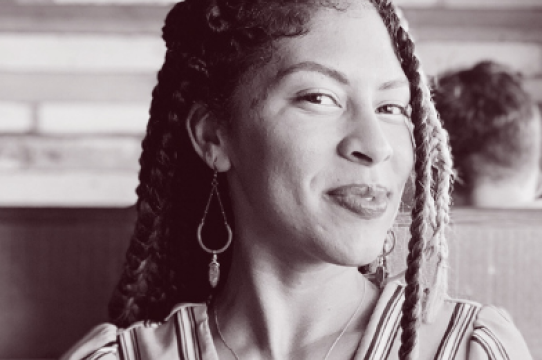As a first-generation American, first-generation college graduate, and an adult child of a formerly incarcerated parent, Lindsey Tavares-Sabido has met more than her share of challenges. But every step of the way she has managed to succeed beyond the norm. Now, as a recent UC Santa Cruz graduate and the program coordinator at UCSC’s Institute of the Arts and Sciences (IAS), she is well on her way to further success.
Tavares-Sabido has loved working directly with students to plan public events, programming and exhibitions. “It was amazing to see the fruits of our labor with the Surge: Afrofuturism series and contribute to ongoing programs like Visualizing Abolition and Solitary Garden,” she says. “I feel like I’ve been given many opportunities to learn about the ins and outs of putting on exhibitions — from the initial conception to installation — and that has sparked many new interests for me and what I hope to explore more in my role.”
Throughout her childhood, being raised in various areas of New York City and New Jersey, Tavares-Sabido was used to moving around a lot. “Since my dad was incarcerated for the majority of my childhood, my mom was a single mother who worked three jobs at once to provide for me as a child,” she says. “My grandmother also assisted my mom in taking care of me when we moved to New Jersey.”
In time, her mother remarried and she credits her stepfather, who is originally from Pakistan, as being an amazing figure in her life. “I am a part of the first-generation of Americans on my mom, dad, and stepdad’s side of the family and so culturally, I feel very connected to Central America, the Caribbean, and South West Asia, and grew up with many of those foods, dances, music, religious practices, and traditions,” she says.
Her decision to attend UC Santa Cruz as a legal studies major was based not only on the natural beauty of the campus, but also because she was able to attend classes from a wide variety of disciplines. She appreciated her professors at UCSC, especially Hiroshi Fukurai, Camilla Hawthorne, and Xavier Livermon who she cites as being exceptionally inspiring. “Beyond being experts in their field, they also provided incredible guidance to their students and encouraged us to think more critically regarding law, institutions and society,” she says.
While a student, Tavares-Sabido was also very active with UCSC’s Black Student Union (BSU), serving in 2020 as the political and cultural chair and then in 2021 as the organization’s historian and digital archivist, managing BSU’s images, flyers, documents and records.
As BSU’s political and cultural chair, her responsibilities covered staying current with the latest political and cultural events and topics that were relevant to the campus’s Black community and advocating for them. She also coordinated a minimum of one political and/or cultural campaign per quarter, which could include a teach-in, a field trip to a play or a museum, etc.
On June 1, 2020, during the height of the pandemic, Tavares-Sabido composed an impassioned letter to the UCSC administrators, faculty, and staff titled “Unrelenting Anti-Blackness of 2020” that addressed many important and upsetting issues that endangered Black students, including racist threats that manifested in some online classes as Zoombomings, and the severe effects of the murders of innocent Black Americans such as Ahmaud Arbery, Breonna Taylor, and George Floyd.
Part of what the letter said included: Our bodies are under constant attack, and our survival is a constant struggle. We struggle now against the fact that Black people are being massacred at the authorization and sanction of our governments, institutions, and leaders. But even beyond this struggle is the often overlooked reality that rampant health disparities in the Black community, a consequence of deep-seated systemic racism, are leaving us most vulnerable to contracting and dying of COVID-19. As everyone else transitions back into their “normal lives” our anxieties evolve into distress. Summer is not as it should be. For us, what should be peaceful walks and trips to the beach are survival sports. Even during quarantine we are made to endure the terrorism and mass death of our people, often at the hands of the police state.
But her ardent commitment to social justice didn’t stop there. During 2020-2021, she developed UCSC’s Pan African Research Fellowship pilot program in partnership with the Chancellor’s Office and the Division of Student Affairs and Success. “While initially conceived as a summer program, it extended through the academic school year and concluded with a public symposium where we presented our findings to administrators and the UCSC community during student achievement week,” she says.
She’s also done important work with the Walls to Bridges Project, a nonprofit that sends children’s books, on behalf of their incarcerated loved ones, to family members in order to keep them connected. The team that runs the organization is made up of UCSC students and recent alumni, and was founded by Alyssa Tamboura who is currently a UCSC student and came up with the idea after having to visit her father at San Quentin State Prison.
Another remarkable group that Tavares-Sabido has been affiliated with is Bay Area Children of Incarcerated Parents Partnership (BAYCIPP). Working as their operations and partner services coordinator, she collaborated with the steering committee and community-based organizations that were working on criminal justice reform efforts across the Bay Area.
“My social identity not only impacts the work that I do, but also how I show up in the world,” she says. “I recognize the privilege I have as a first-gen American and college graduate, and also have personally experienced the challenges that come alongside not having proper guidance, mentors, or role models in my immediate circles. I am also aware of how being system-impacted affected my ability to have access to certain opportunities, networks, and resources. All of these markers that underscore who I am are grounded in my lived experience and drive my passions for restorative justice and social equity.”
In the near future, Tavares-Sabido is putting together a diversity, equity and inclusion-focused venture via the Art Division’s University of the Future, Now! Initiated by Dean Celine Parreñas Shimizu, this new initiative provides funding for faculty, staff and students to create a DEI-focused project on campus.
Called the UCSC Black Student Archives Project (BSAP), Tavares-Sabido’s project will seek to collect, preserve, and share archival material from UCSC students past and present. BSAP will consist of the Black Student Union unprocessed physical archives, “See you when I see you… Black Student Life at UCSC 1965-present” by Jazmin Benton, PhD student, Visual Studies, and contributions from past and present Black UCSC students.
Considering how much Tavares-Sabido has achieved in such a short time, it’s clear to see that her incredible star will continue to shine. Her persistent advocacy is an outstanding example for future generations.
Tavares-Sabido’s advice for Black students who are new to UCSC is to seek solid support. “Find your community and make use of all the resources campus has to offer you! Also, please don’t hesitate to reach out and ask me for help. The ABC (African, Black, Caribbean) community on campus is small, but mighty, and we are here to support the success and retention of ABC students.”


